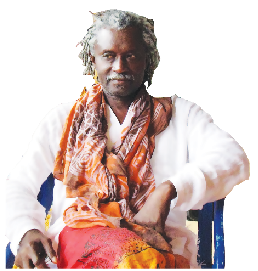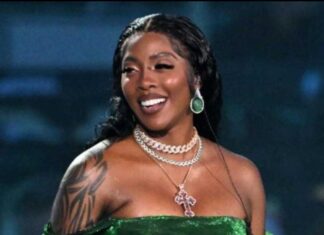Temitope Ojo attempts to unravel the riddle of the artist in mid-life
Jimi king sage like always intrigues in an enduring sort of way. For quite a while he has shuffled the Atlanta- Lagos route. Does that make him half – diaspora? Whatever it is he resolutely refuses to be separated for too long from base.
The artist – fibre and clothing has it right there in his DNA. He is a third generation textile and clothing designer. The genes run that deep. His Sierra Leonean grandfather was a bespoke tailor at a time when `bespoke` meant `gifted,distinguished`. His maternal grandmother was a textile artist, while his paternal grandmother was an Itoku indigo adire artist.`Such is the background that I had, just watching them got into my psyche,so it was easy for me to decide`.
Not surprisingly he could not suppress that which comes natural.He started out in his high school days. He used to buy fabrics at the bustling Lagos avant- guard commercial hub of Ojuelegba. He would then peddle them to his classmates and friends to order at the highly rated Catholic Secondary School, St. Finbarrs College.
That looks like an eternity ago. Its obviously a different ball- game now. Commuting between two continents gives him a birds – eye view through which he can make a comparative assessment. Jimi king is an unrepentant pan – Africanist in his analysis.
“ I don’t think we should compare because Nigeria or Africa is the mother of almost everything on the planet“. What is happening in his opinion is that` the mother was deprived of growth while the children kept growing`.
Here, there are shades of the black nationalist outlook of the 1960s in his world view. `Slavery actually held us back but we are still blaming the slave masters and licking our wounds. Malcolm X said“ you can blame a man for striking you down, but you cannot blame him if you refuse to get up”.
He his emphatic following from where the noted black nationalist Malcolm X left off that a` greedy and ignorant` post- independence leadership betrayed the dreams of emancipation. The leadership in his opinion have been short- sighted,selfish and greedy. Because of this the people have lost out.
Linking this bugbear to his own profession he points out that` it will be hard to compare to the rest of the world because Africa is still stuck with using cotton and wool on local level. We are not yet of the vision that we want to clothe the rest of the world. The leadership is not taking fashion serious. They are just doing it the way our forefathers had handled fabrics because you can’t do fashion without fabrics. Be it plastic, synthetic or natural, you have to work with some kind of medium to translate it into wearable art.`
The drawback from this approach is debilitating. ` We are not moving on in terms of fabrics because it is the fabrics that is making contemporary fashion progressive. Some of the synthetic fabrics and the wools that they use are not locally made. They are importing the yarns and spinning and then weaving it into fabrics they make’.
For jimi king the way forward is covered with thorns. There is the well – worn resistance to change. No one in his opinion is listening, cocooned in the comfort zone of corruption. Until the level of corruption is reduced there can be no forward movement and the atmosphere will be clouded by corruption.
A trained textile artist, he works mostly with adire. He used to have a factory in Abeokuta where, with an uncle helping out, he did all his printing. He still does that, however there are not enough hours in a day to make his prints. Out- sourcing is inevitable here. ` So I make some myself and I have a couple of staff in my studio here and abroad. But I still do some of the traditional things I used to do in the 80`s but I am constantly evolving techniques`.
Jimi king is self- effacing on issues relating to`what`s been your highest point so far?`. He parries the question.’ I haven’t reached the highest point. It is coming. I have been on a plateau for a while. And from a plateau,we are going to the top of the mountain. When I reach my highest point would be when I die`.
He has never felt like quitting inspite of the well known debilitations relating to funding and the other factors limiting growth. There is also the lack of trust and ignorance in personnel relationship.
He is certainly not forcing his children into the trade. Very sensibly he wants them to make their own mark in any chosen field where they can a difference. A Jazz enthusiast he also likes Appala and is into Igbo music, `where they play the flute and pots`.
















